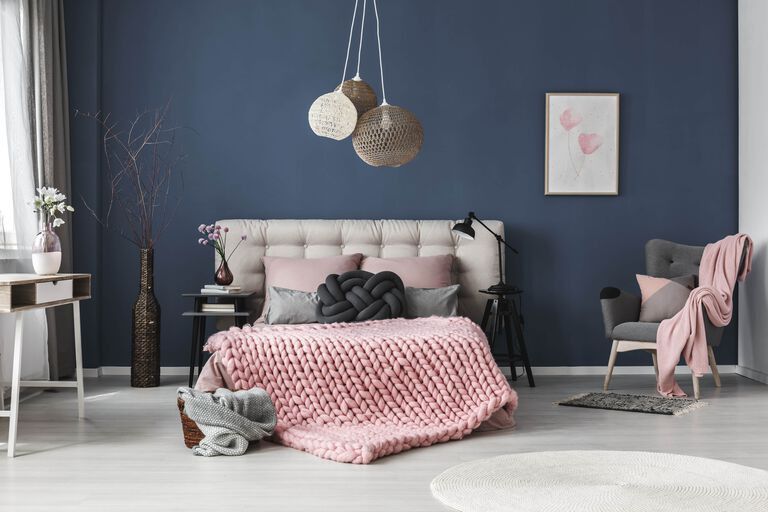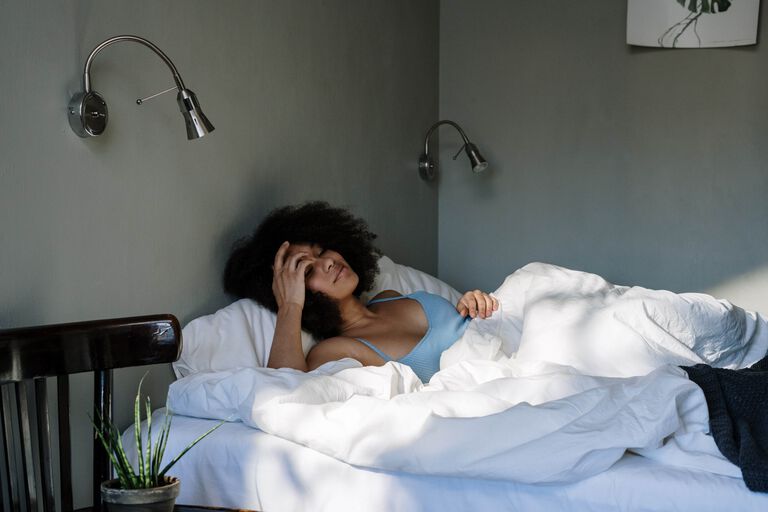Sleeping with pain: 6 things you should know
Ever struggled to get a decent night’s sleep due to pain, or felt that your pain was worse after a bad night? You’re not alone.
Pain and sleep have a complicated relationship. So let’s explore how they are inter-linked and the steps you can take to get a better night’s sleep.
1. How does pain affect sleep?
The relationship between pain and sleep is complex. They have a reciprocal relationship – meaning pain can cause poor sleep, and poor-quality sleep can slow down healing or make your pain worse. This can unfortunately mean people struggling with pain find themselves in a continuous pain/sleep cycle, with their lack of sleep and pain worsening over time.
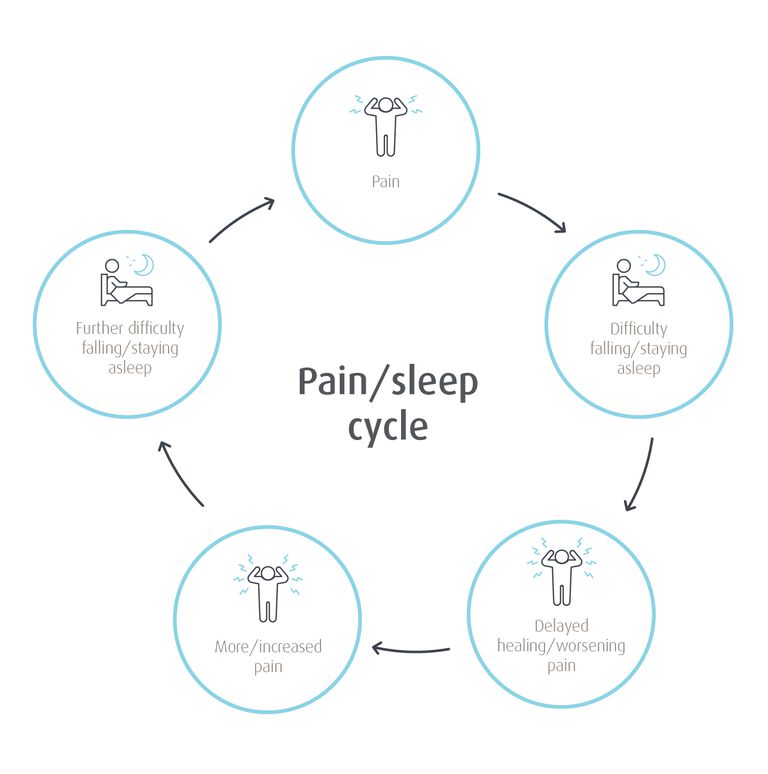
Being in pain can:
- Make it difficult to fall to sleep
In order to drop off, your nervous system needs to calm down. People with chronic pain typically have more active nervous systems[i].
- Consistently cause you to wake throughout the night
Rolling or moving in certain ways can cause a spike of pain that disturbs your sleep. And if pain causes you to wake once, it’s likely to do so again and again[ii]. Pain-related insomnia gets worse over time, leading to a build-up of poor sleep.
- Prevent you from getting truly restorative sleep
If your sleep cycle is disrupted by pain, even if you don’t fully wake, you may not get enough REM sleep which is when your brain and body fully relax. This can lead to reduced coping skills and even migraines.
1. Common causes of pain-related sleep problems
Feeling pain get worse at night – Pain can become more noticeable when there’s nothing to distract you during the night.
Struggling to get comfortable – It may be difficult to lay in your normal sleeping position.
Worrying – Worrying about your pain, and its impact on your sleep, can make it even more difficult to sleep.
Mood changes – If your pain is affecting your overall mood it can create excess tension in your body, making it difficult to relax and doze off.
Medication – Pain medication can make you drowsy and cause you to sleep at irregular times during the day, upsetting your internal clock and making it difficult to sleep at night. Some medications also have side effects, including sleep apnoea, which affect sleep quality.
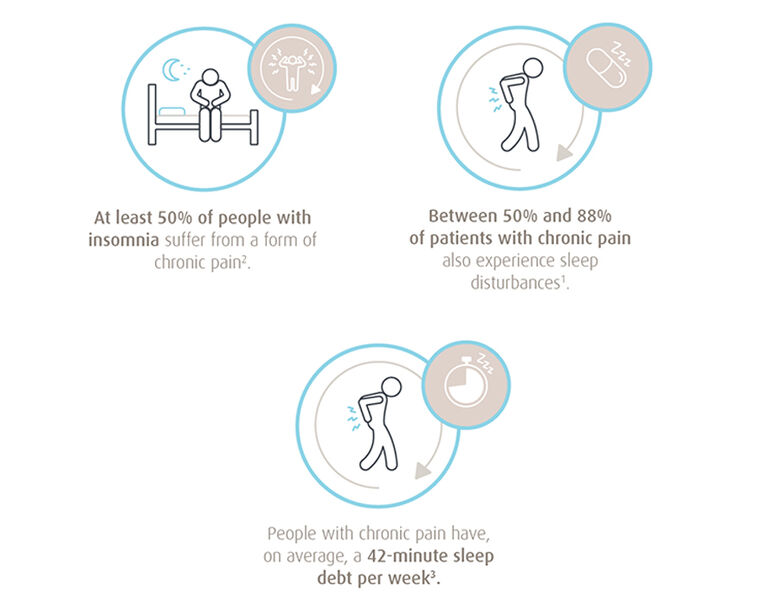
3. How does sleep affect pain?
A good night’s sleep can leave you feeling refreshed, so it makes sense that poor-quality sleep can negatively affect our health.
Research shows that insufficient sleep can:
- lower pain thresholds[iii]
- delay recovery from injuries[iv]
- exacerbate pain[v]
If you’re struggling with chronic pain, these effects can be even more pronounced. For example, in patients with fibromyalgia, a poor night’s sleep leads to greater pain the next day[vi]. On the other hand, research also shows that improved sleep leads to decreased pain in fibromyalgia patients[vii]. So you see, the importance of good quality sleep continues to play a huge part in our health.
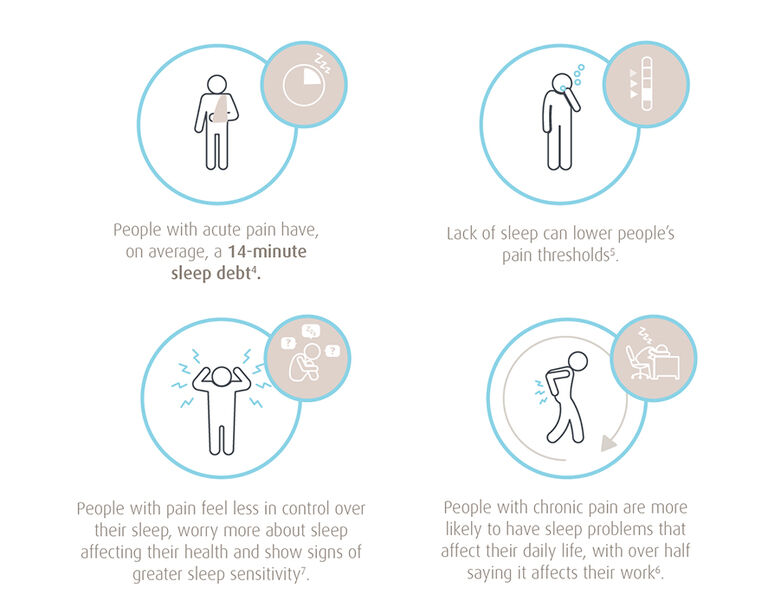
4. The pain cycle - which comes first – pain or poor sleep?
Sometimes it’s easy to identify which came first – pain or poor-quality sleep. For example, you may have suffered an injury and found that led to sleep struggles.
However, it can sometimes be more complicated to work out which is the cause, with experts comparing it to a ‘chicken or egg’ scenario.
If you’re struggling from a combination of pain and poor sleep, like waking up with back pain, it’s important to speak to your doctor so they can help you get to the root of the problem.
5. Breaking the cycle: Sleeping tips to help people in pain
The good news is that experts agree it is possible to break the sleep/pain cycle. If you’re regularly not getting enough sleep due to pain, it’s important to speak to your doctor to see if your condition is being managed properly. They may also be able to recommend some treatments or exercises that can help.
Improving your sleep hygiene can help give yourself the best chance at a good night’s rest. Some recommended sleep-promoting behaviours include:
Spending time out and about during the day
It’s important to get out and about during the day, while it’s light. This helps reset your internal body clock. Then, at night, the darkness will make you feel drowsy and ready for sleep.
Avoiding food, caffeine and alcohol before bed
Food triggers digestion which can keep you awake. It’s advisable to eat at least two hours before bedtime. You should also stay away from caffeinated drinks and alcohol if you’re having trouble sleeping.
Avoiding screens before bed
Avoid watching TV or using your phone before you go to sleep and instead do something that will relax your mind and muscles, like taking a hot bath. Or you can start a ritual that you start to associate with sleep, for example reading a book or doing some relaxation techniques.
Sticking to a routine bedtime
Go to bed and get up at roughly the same times each day. Getting up at the same time is particularly important as it helps reset your inner clock.
Getting up if you’re struggling to sleep
Getting up and out of the bed is better than lying awake for hours. This prevents your brain from associating your bed with lack of sleep.
Investing in the right mattress and bedding
You should ideally be spending around 8 hours a night in your bed, so you need to ensure it’s comfortable and suits your needs. Speak to a mattress specialist and find the one that’s right for you.
Find your nearest TEMPUR® stockist.
6. How can TEMPUR® mattresses help you get a better night sleep?
If you’re struggling to get the sleep you need due to pain, a TEMPUR® mattress could help. In fact, we often hear our mattresses referred to as a secret weapon in the battle against pain.
TEMPUR® Material was originally developed for medical purposes and some forms of our Material have been clinically proven to relieve pressure points on the body, enabling several of our products to be CE-marked as medical devices in the EU.
The material’s super adaptive properties ensure your entire body is evenly comforted and supported. By reducing pressure points, TEMPUR® Material also helps to reduce tossing and turning at night, meaning you’re less likely to twist your body into a position that could cause pain, stiffness and discomfort, and helping you get the deep, restorative sleep you need to help your body recover[viii]. Research[ix] in the UK, France and South Korea shows that people who own a TEMPUR® mattress are less likely to wake up with aches, pains or stiffness.
See how TEMPUR® Material could help you get a better night’s sleep and find the right mattress for you, online or at one of our showrooms.
References for infographics
- [1] https://www.ncbi.nlm.nih.gov/pmc/articles/PMC5749281/
- [2] https://www.ncbi.nlm.nih.gov/pmc/articles/PMC4046588/
- [3] https://www.sleep.org/articles/sleep-pain-beat-cycle-improve-sleep/
- [4] http://www.sleephealthjournal.org/pb/assets/raw/Health%20Advance/ journals/sleh/2015SleepinAmericaPollSummaryofFindings.pdf
- [5] https://www.ncbi.nlm.nih.gov/pubmed/10405949
- [6] https://www.sleepfoundation.org/articles/pain-and-sleep
- [7] https://www.sleepfoundation.org/articles/pain-and-sleep
Other References
- [i] https://uihc.org/health-topics/role-your-central-nervous-system-chronic-pain
- [ii] https://www.webmd.com/sleep-disorders/features/pain-and-sleep#1
- [iii] https://www.independent.co.uk/news/health/sleep-deprivation-pain-sensitivity-aches-hurt-study-university-california-krause-walker-a8772261.html
- [iv] https://dynamichealth.je/2019/08/12/pain-injury-recovery-and-sleep
- [v] https://www.arthritis.org/health-wellness/healthy-living/managing-pain/fatigue-sleep/sleep-and-pain
- [vi] https://www.medscape.com/viewarticle/804588
- [vii] https://www.ncbi.nlm.nih.gov/pubmed/25907704
- [viii] Ylinen, Jari, ‘Sleep Ergonomics’, 2016
- [ix] Disclaimer: Interviews carried out by Quadrangle Oct-Nov 2019. 481 UK, 607 French and 654 South Korean mattress owners participated. Calculated by comparing the average score of TEMPUR owners with the average score in each market of 6 competitor brands in UK, 6 in France and 3 in South Korea. Competitor average calculated by adding the competitor brands scores together and then calculating the average for each market.
Feel it for yourself
Find a TEMPUR store or Stockist and try out our range of mattresses for yourself

Download our brochure
Want to know more about our story? Download our brochure to see more.

Visit a TEMPUR® store or talk to a sleep expert
Want to know more about TEMPUR®? Either visit us in store or arrange to speak to us today.
Get the latest news and offers
Sign up to receive news and offers about TEMPUR® products. Detailed information on the use and storage of data can be found in the Privacy Policy.


